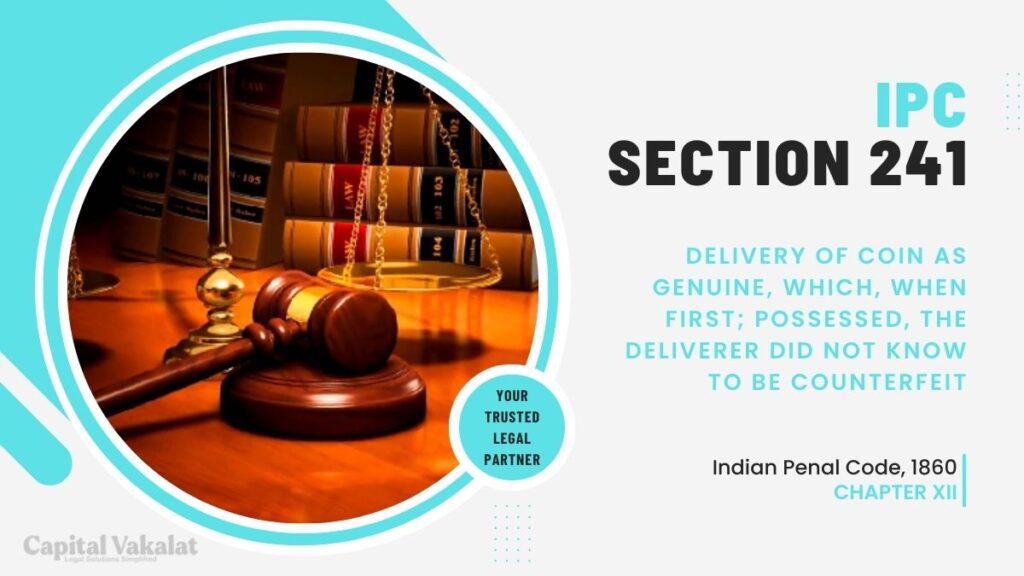In the labyrinth of Indian legal statutes, Section 241 of the Indian Penal Code (IPC) stands as a unique provision that pertains to the delivery of a coin as genuine, even when the deliverer did not know it was counterfeit at the time of possession.

This intriguing aspect of the law raises questions about the legal implications, historical context, and practical relevance of such a provision.
Understanding the Key Elements
At its core, Section 241 IPC deals with the act of delivering a coin as genuine, despite the lack of knowledge regarding its counterfeit nature when initially acquired. To comprehensively analyze this section, we must break down its key elements.
Delivery of Coin as Genuine:
The first element, ‘delivery of coin as genuine,’ implies presenting a coin as authentic without any disclosure of its actual nature. This can be done through various means, including trading, selling, or using the coin in transactions.
The Knowledge of Counterfeit:
The crucial aspect of this section revolves around the knowledge of the coin being counterfeit when initially possessed. If the deliverer was aware of the coin’s counterfeit nature at the time of acquisition, the provisions of Section 241 IPC do not apply.
Historical Context of Section 241 IPC
To grasp the significance of Section 241 IPC, we must delve into its historical context. This section traces its origins to the British era, dating back to the 19th century when the Indian Penal Code was drafted. At the time, counterfeiting coins was a rampant issue, necessitating strict legal provisions.
Legal Implications of Violating Section 241 IPC
Criminal Liability:
Violation of Section 241 IPC can have serious consequences. The deliverer may be charged with a criminal offense under this section, leading to legal proceedings.
Punishments:
The punishments for contravening this section can vary, depending on the severity of the offense. It is essential to explore the various penalties and sentences associated with such violations.
The Burden of Proof
In cases falling under Section 241 IPC, the burden of proof rests on the prosecution. To establish an individual’s guilt, the prosecution must demonstrate that the coin was delivered as genuine, and the deliverer had no knowledge of its counterfeit nature at the time of possession.
Case Studies and Precedents
To gain a better understanding of how Section 241 IPC is applied in real-life situations, it is instructive to examine relevant case studies and legal precedents. These examples can shed light on the nuances of the law and the judicial interpretation of its provisions.
Controversies Surrounding Section 241 IPC
Like many legal provisions, Section 241 IPC is not without its controversies. There have been debates and discussions regarding its fairness, practicality, and the need for reform in a changing society.
Relevance in the Modern World
In a digital age, the concept of counterfeiting has evolved beyond physical coins. We must consider how Section 241 IPC applies to the modern world, where digital currencies and online transactions have become the norm.
Challenges in Enforcement
Enforcing Section 241 IPC presents its own set of challenges. The ability to prove the lack of knowledge about a coin’s counterfeit nature at the time of possession can be complex, especially when dealing with digital currencies and electronic transactions.
Conclusion
Section 241 IPC, dealing with the delivery of a coin as genuine when the deliverer did not know it was counterfeit, serves as a testament to the evolution of legal provisions over time. Its historical roots, legal implications, and relevance in the modern world make it a captivating area of study. While controversies exist, the importance of addressing counterfeit currency remains, even in the digital age.
Frequently Asked Questions
What evidence is typically required to prove a violation of Section 241 IPC?
To establish a violation, the prosecution usually needs evidence showing that the coin was delivered as genuine, and the deliverer had no knowledge of its counterfeit nature at the time of possession.
Are there any proposed amendments or reforms to Section 241 IPC?
At present, there are no widely known proposals for amending Section 241 IPC, but legal reform is an ongoing process.
How can individuals protect themselves from inadvertently delivering counterfeit coins?
To protect themselves, individuals should be vigilant and educate themselves about counterfeit coins, especially in the context of numismatics.
Does Section 241 IPC apply to antique or rare coins with historical value?
Section 241 IPC generally applies to any coin presented as genuine, regardless of its historical or numismatic value, as long as it was acquired without knowledge of its counterfeit nature.